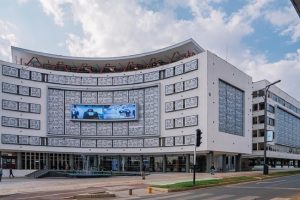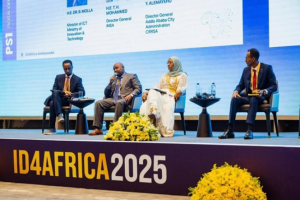
BY DARGIE KAHSAY
Last Week, Gafat Aerospace Engineering Development Center (GAEDC), a center under Debre Tabor University, successfully conducted a rocket launching experiment which successfully pierced its way over 20,000 feet into the space. The rocket was fully designed, constructed and launched by the researchers, instructors and students of the university. The center started the rocket-launching test last year during the 154th memorial of Emperor Tewodros-II and the pilot launching program last year was successful.
By upgrading the last year’s pilot rocket, this year a bit advanced rocket was developed and launched by the center in connection with the 155th memorial day of Emperor Tewodros. This year, the center launched three different rockets. The three rockets were named Prince Alemayehu, Empress Taytu and Emepror Tewodros-II.
The biggest of the three rockets launched during this year, named “Emperor Tewodros 2015-1” covers a larger distance and rises over 20,000 feet to the space. Deputy President for Research and Community Services at Debre Tabor University, Menberu Teshome (PhD) said that the proposal to build a rocket science center at the university was started five years ago. After the project proposal, a small workshop was established by the effort of teachers and students of the university.
Following the continuous efforts without adequate budget, finally the university supported the efforts of the committed researchers to found a research institution in the aerospace sector. Finally, in 2021, Gafat Aerospace Engineering Development Center (GAEDC) was founded to realize the research in the space sector at Debre Tabor University. And now, the center has launched its own designed rocket that successfully conducted the experimental launch and the rocket rose over 20 thousand feet into the space before making an n-curve.
Debre Tabor University President, Anegagregn Gashaw (PhD) for his part said that the center was formally founded last year after it conducted different research activities entitled Rocket Science project. The center was established with the goal of developing the scientific research activities by the researchers of the university in the space science sector.
According to Anegagregn research and technology transfer is one major part of a higher education institutions and Debre Tabor University is investing in research and community services parallel to the teaching-learning process. To realize the efforts of the researchers of the university in the space science, the center was founded with its own structure. For the president, the center is vital in research, technology transfer, as practical experiment for students and researchers of the university and to support Ethiopia’s technological development.
Hailegebriel Demoz is a fourth year Electrical and Computer Engineering student at Debre Tabor University. He is also a Team Leader of Electrical sector at Gafat Aerospace Engineering Development Center .He was participating in security analysis and signal processing at the center during t the rockets launching test last week.
Hailegebriel was part of the team that designed, constructed and launched the rockets by the center. He partook in both the last year’s pilot tests and this year’s project. He said that the center is helping students to practice the theoretical frameworks in the class and to develop their practical knowledge in the sector. He is developing his skills as he participates in the whole process of the rocket work and even he is a team leader of the electrical sector.
For Hailegebriel, participating in such practical experiments is vital for students. It affords a great experience to enhance their research skills. In addition, such centers are vital in developing locally-initiated technologies and enhancing researches. From the successful launching of the rockets prepared by the center, the students and researchers developed a lot of scientific experiences and he said. The successful launching of the rockets would initiate the team to move a step forward to develop space science research.
Gezahegn Reta is also a fifth year Electro Mechanical Engineering student at the university and a rocket researcher at Gafat Aerospace Engineering Development Center of the University. He was part of the team in preparing the rockets launched. Sharing Hailegbriel’s idea, Gezahegn stated that the center is a practical experiment center for students in addition to its research in the space science sector.
Belete Getachew, an instructor at the university, is founding member and chairman of the Gafat Aerospace Engineering Development Center. For Belete, the center is becoming an experiment hub for students and researchers of the university. For him, the center is working to develop capable and skilled scientists that can compete at the international level in the space science sector for the future. The university is also giving due attention to the center to make it center of excellence in the space science field in producing well-equipped scientists and researchers.
According to him compared to the first rocket fired last year, the rockets fired this year are enriched with further research and modern technological materials. “We launched the first pilot rocket produced by the center last year. The first one was simple and easy rocket. This year, the center produced more developed rockets than that of the last years with additional researchers and materials. The development is a promising move to realize the vision to turn the center a center of excellence in the space science sector,” Belete stated.
According to the chairman of the center, the vision of GAEDC is to produce skilled researchers and scientists in the space science sector that can compete internationally, to produce materials that can reach to the space and to make the center a space research center in the long run. “By investing in the space science research, the center would play its role to support Ethiopia’s development by using the space. Developing researches in the space would help to exploit the potential resources in the space for the development of our country,” he added.
For Belete, in the future, the researches in the center would focus on exploiting the space science for communication, agricultural development, for mining and other development activities. “At this time, we start by launching simple rockets, in the future; our goal is to produce and to launch satellites. Everything needs a process as you can never change things over night” he noted.
The aim of conducting the firing of the current simple rockets according to Belete is to promote the researchers. Anegagregn, President of the University, further noted that the successful firing of rockets produced by the capacity of the center’s researcher shows that with additional investments and supports, it is possible to bring meaningful achievements in the space sector with our researchers.
Ethiopia accords due attention to the space science sector to use it to facilitate its development endeavors. In 2019, Ethiopia launched its first ever remote sensing satellite, ETRSS-1. Anegagregn stated that as Ethiopia is investing its maximum efforts to develop researchers in the space science, higher education institutions should support the country’s efforts by producing skilled human power and developing researchers in the sector. The effort of the university and the center, according to him, is to produce skilled researchers to support Ethiopia’s development endeavors.
“If we want to see a developed and prosperous country, we have to focus on researchers today. Today’s attempts, experiments and efforts would finally achieve something helpful for our development. Technology and scientific outcomes need process and continuous experiments, it is not an overnight outcome” Anegagregn added.
For his part, Amhara Regional State Commissioner for Science and Technology Commission, Sale Ayalew (PhD) said that the research efforts of Debre Tabor University in the space science sector is promising and would be helpful in Ethiopia’s researches in the sector in the near future.
THE ETHIOPIAN HERALD FRIDAY 19 MAY 2023




